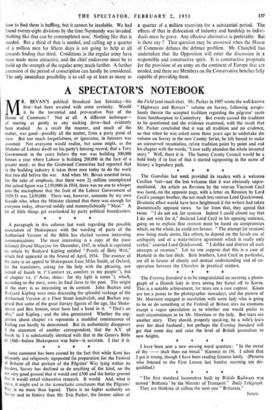The Guardian last week provided its readers with a welcome
Cecilian iuet—not the less welcome that it was obviously unpre- meditated. An article on Reunion by the veteran Viscount Cecil was faced,. on the opposite page, with a letter on Reunion by Lord Cecil's younger brother, the not much less veteran Lord Quickswood. Dramatic effect would have been heightened if the writers had taken diametrically opposed views. So far from that, they agreed like twins. " I do not ask for reunion. Indeed I could almost say that I do not wish for it," declared Lord Cecil in his opening sentence, going on to explain that reunion must be based on compromises which, on the whole, he could not favour. " The attempt (at reunion) now being made seems, like others, to depend on the lavish use of ambiguity and of a make-believe agreement which is really only verbal," asserted Lord Quickswood. " I dislike and distrust all such attempts at reunion." Let no one suppose that this is a case of Hatfield in the last ditch. Both brothers, Lord Cecil in particular, are all in favour of charity and mutual understanding and of co- operation between the Churches in practical matters.


































 Previous page
Previous page